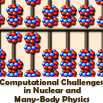Speaker
Mikael Fremling
Description
Using methods based on conformal field theory, we construct
model wave functions on a torus with arbitrary flat metric
for all chiral states in the abelian quantum Hall hierarchy.
These functions have no variational parameters, and they
transform under the modular group in the same way as the
multicomponent generalizations of the Laughlin wave
functions. Assuming the absence of Berry phases upon
adiabatic variations of the modular parameter $\tau$, we
calculate the quantum Hall viscosity and find it to be in
agreement with the formula, given by Read, which relates the
viscosity to the average orbital spin of the electrons. For
the filling factor $\nu=2/5$ Jain state, which is at the
second level in the hierarchy, we compare our model wave
function with the numerically obtained ground state of the
Coulomb interaction Hamiltonian in the lowest Landau level,
and find very good agreement in a large region of the
complex $\tau$ plane. For the same example, we also
numerically compute the Hall viscosity and find good
agreement with the analytical
result for both the model wave function and the numerically
obtained Coulomb wave function. We argue that this supports
the notion of a generalized plasma analogy that would ensure
that wave functions obtained using the conformal field
theory methods do not acquire Berry phases upon adiabatic
evolution.

